Anyone learning English has a hard job on their hands. Lots of words don’t sound the way you might expect from their spelling and lots of idiomatic phrases don’t seem to make much sense.
Even native English speakers had to learn at some point and, when we were young, the difference between ‘mute’ and ‘moot’ or ‘slight’ and ‘sleight’ was lost on us, and we often carry these mistakes into adulthood.
Many of the mispronounced or misspelled versions of our everyday expressions make some kind of sense and are understandable mistakes.
Here’s a list of the most common mistakes that people make with phrases.
1. You’ve got another thing coming
Correct version: “You’ve got another think coming”
This one has to head the list. Wrong as it is, the ‘another thing coming’ version has become so commonplace that it can only be a matter of time before it becomes accepted. You may even come across the view that “another thing coming” is correct.
It may help to look at the whole phrase. When someone says “if you think that, you’ve got another think coming” what the speaker is meaning is “if you think that, then your thought is wrong, you need to have another one”.
It’s something of an uphill battle to get the correct form re-established but, at least, it does provide the opportunity for a pleasing self-referential comment – “If you think that ‘you’ve got another thing coming’ is correct, then you’ve got another think coming”.
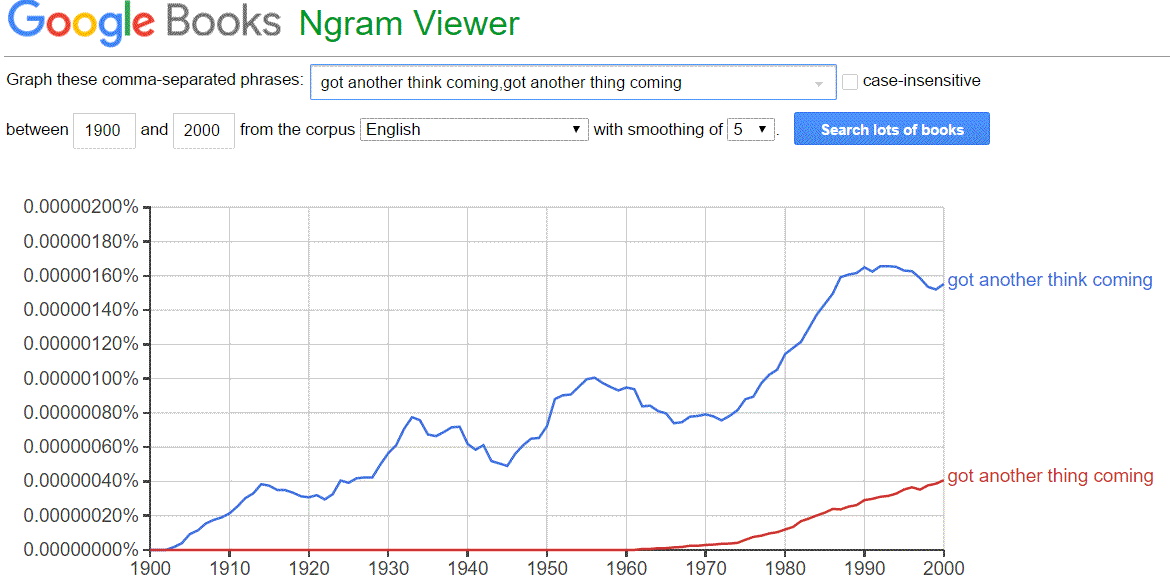
Read more about the meaning and origin of ‘Another think coming’…
2. Baited breath
Correct version: “Bated breath”
It is incorrect but ‘baited’ is an understandable misspelling; after all, when do we ever come across the word ‘bated’ apart from in this phrase?
All becomes clear when you realise that ‘bated’ is just a shortened version of ‘abated’. Abated breath, that is, breathing that is restrained, is what is meant by the phrase ‘bated breath’.
Read more about the meaning and origin of ‘Bated breath’…
3. Escape goat
Correct version: “Scapegoat”
Again there’s a germ of sense in the incorrect version – after all, goats do have an unrivalled talent for escaping.
A scapegoat is one who is blamed or punished for the faults of others. If you want to know why goats get it in the neck, click on the link below.
(and PS, it’s scapegoat, not scrapegoat – that isn’t a word).
Read more about the meaning and origin of ‘Scapegoat’…
4. Beckon call
Correct version: “Beck and call”
Once again, ‘beckon call’ seems right – to beckon someone is to call them over, so the two words seem to go well together. Also, ‘beck’ isn’t a word most people are familiar with and it’s reasonable not to recognise it as a part of the language. However, it is a word – it’s just the short version of ‘beckon’. So, you could argue that ‘beckon call’ isn’t far from being correct and, as language crimes go, perhaps this is just a misdemeanour.
Read more about the meaning and origin of ‘Beck and call’…
5. On tender hooks
Correct version: “On tenterhooks”
Tender hooks? Surely, whatever you might say about hooks, tender they aren’t. Once again, we get caught out by an archaic word that isn’t used outside of this expression. This time the word is ‘tenter’, which is a wooden frame used to dry cloth. The wet cloth was fixed to the frame with hooks, hence the expression.
So, ‘on tenterhooks’ means ‘under stress or tension’ and it is easy to see how it came to be used as a general term for anxiety or uneasiness.
Read more about the meaning and origin of ‘On tenterhooks’…
6. First come, first serve
Correct version: “First come, first served”
‘First come, first serve’ seems to suggest that the person who arrives first serves the latecomers. Not so; the expression means pretty much the opposite, that is, the first to arrive gets served first.
‘First come, first served’ is a proverbial expression which is itself is a shortened form of the earlier proverb ‘he that comes first to the mill grinds first’, which is found in Chaucer’s 14th century ‘The Wife of Bath’s Tale‘.
Incidentally, the hyphenated ‘first-come, first-served’ isn’t right either; that would just turn a mispronunciation into poor punctuation.
See our extensive list of English proverbs…
7. Card Shark
Correct version: “Card sharp”
This one isn’t in the same category as the others as ‘card shark’ is quite acceptable to many people, especially in the USA.
What we have here is a mistake that happened long enough ago to have had time to establish itself in the language.
It’s easy to see why someone who cheats at cards might be called a shark. The word ‘sharp’ is less obviously connected to cheating. We can turn to the Oxford English Dictionary for clarification and find that a ‘sharper’ is “A cheat, swindler, rogue; one who lives by his wits,” and that ‘sharper’ was later reduced to ‘sharp’.
‘Card shark’ came about as a mishearing of the earlier ‘card sharp’ and, as it seemed to make sense, it was adopted and the two terms are now synonymous. However, if you like to get these things right, ‘card sharp’ is the original form.
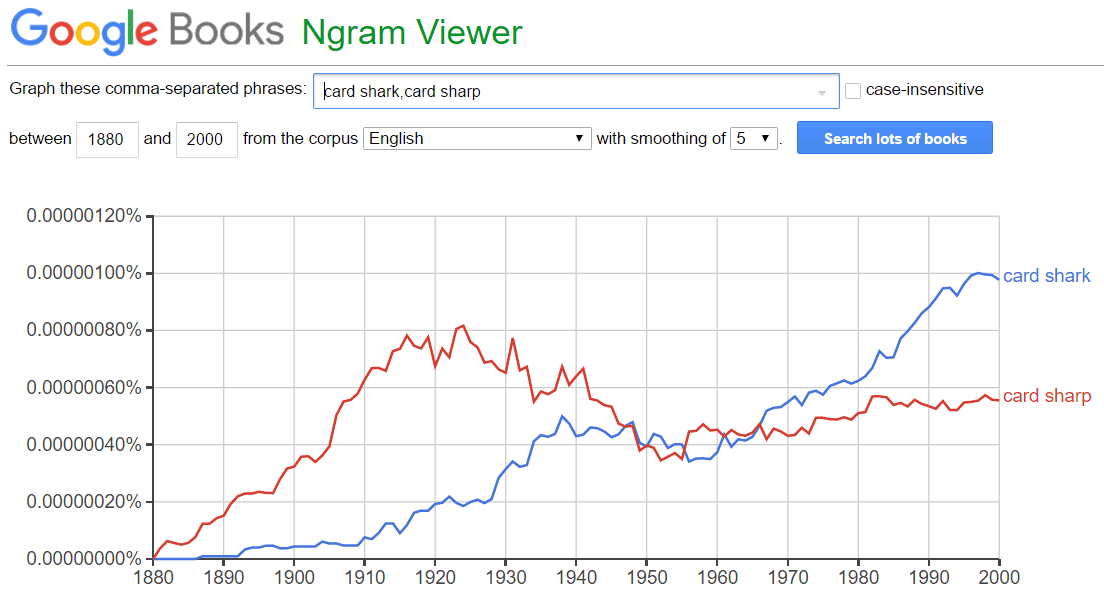
Read more about the meaning and origin of ‘Card sharp’…
8. I could care less
Correct version: “I couldn’t care less”
When people say ‘I couldn’t care less’ it suggests that they don’t care at all, that is, they have zero care. In saying ‘I could care less’ you would be implying you have some degree of care – an amount such that there could be a lesser amount.
This misspoken phrase doesn’t seem, like many of the others, to be the result of a mishearing but of a lack of thought about what is being said. In this respect it matches the current fad for saying that something ‘can’t be underestimated’ when what is meant is ‘can’t be overestimated’. An example of that might be “Einstein’s contribution to physics can’t be underestimated”, which suggest that Einstein’s work was so tiny in its effect that nothing could be less so.
With these two errors there seem to be two things at work. Firstly, the effort required to think through the meaning of the negative expression is more than many want to commit. Secondly, when using versions of the expressions that aren’t correct, the meaning is conveyed by the context and, as language is about meaning, some would say that the ‘correct’ versions are no better than the mistaken ones.
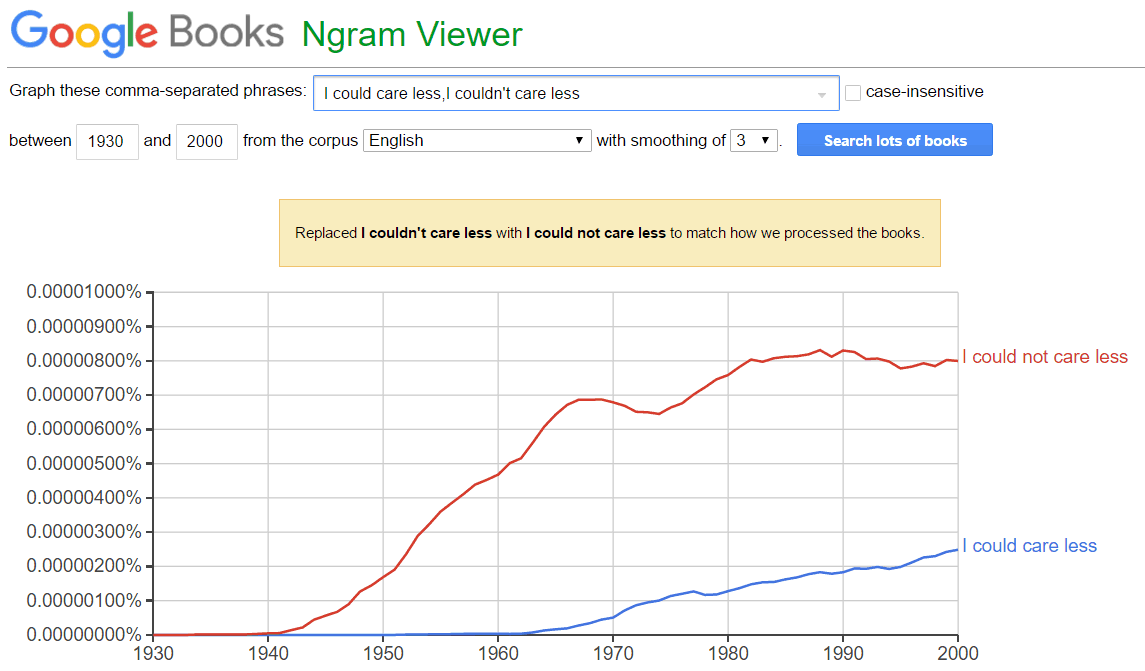
Read more about the meaning and origin of ‘Can’t be overestimated/Can’t be underestimated…
9. Free reign
Correct version: “Free rein”
‘Free reign’ is a pretty straightforward misinterpretation and is a plausible mistake to make. We have a notion of reigning kings and queens doing as they please, that is, they have free reign. Nevertheless, that isn’t correct.
The ‘rein’ in this expression is the strap used by a rider to control a horse. To give a horse ‘free rein’ is to allow it to run as it will, without restriction.
The misspelling ‘free reign’ dates back to the 1880s, so there’s little chance to expunge it from the language; we can but try.
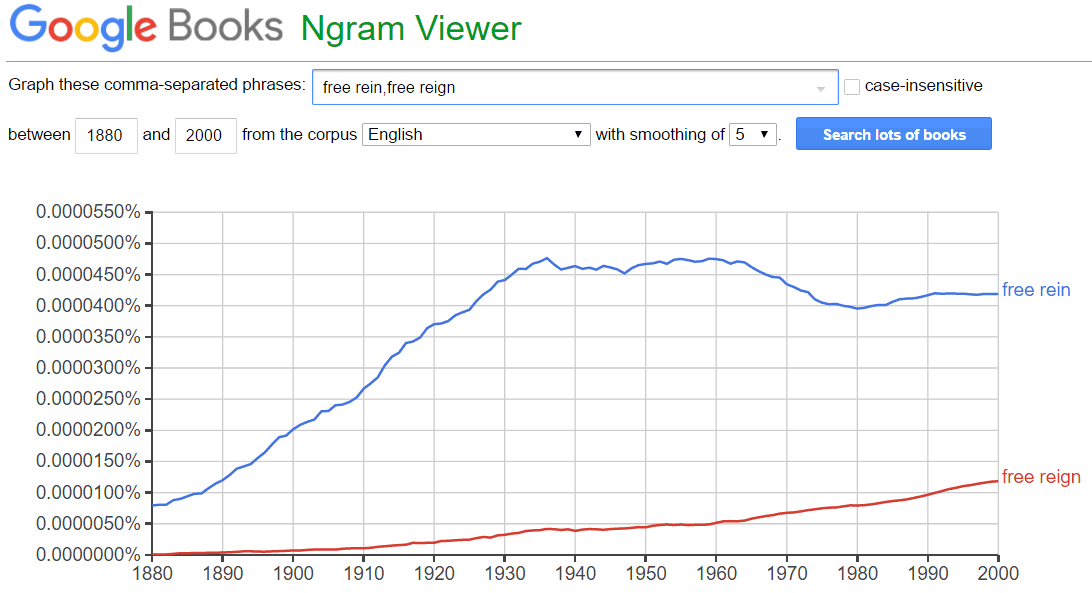
10. Shoe-in
Correct version: “Shoo-in”
A ‘shoo-in’ is a venture that is certain to be accomplished. A horse that is expected to be a sure winner (by cheating or otherwise) might be described as a shoo-in. This is an allusion to the common meaning of ‘shoo’, that is, to drive a hen or other animal in a certain direction by the waving of one’s arms and calling ‘shoo!’. This is pretty easy work – unless the creature is a cat of course.
As ‘shoo-in’ and ‘shoe-in’ sound the same and it is easy to understand why the ‘shoe’ version came to appear in print from time to time. There’s the allusion to door-to-door salesmen who might aim to get a sale by putting a shoe in the door. Also, there may have been a link to shoe-horns, which are used to make it easier to put one’s shoes on.
Nevertheless, there isn’t any connection between this expression and shoes.
11. Slight of hand
Correct version: “Sleight of hand”
Sleight, which is pronounced the same as slight, isn’t a widely used word any longer and many people don’t know what it means. Once you understand that sleight is ‘trickery’/’cunning’ the correct version of the expression makes sense. Conjurers use trickery and deceit to fool us and, when they do it using their hands, that’s ‘sleight of hand’.
The ‘slight’ version makes a sort of sense too. One of the meanings of ‘slight’ is ‘small; imperceptible’ and those are just the kinds of movements magicians make with their hands during tricks. Nevertheless, it’s ‘sleight’, not ‘slight’.
12. Wet your appetite
Correct version: “Whet your appetite”
Here’s another of those archaic words – ‘whet’, what’s that? Well, ‘whet’ means to sharpen or put a fine point on something. So, ‘whet your appetite’ means to sharpen your desire for food.
Confusingly, although we ‘whet our appetite’ we ‘wet our whistle’. In that case our ‘whistle’ means our voice or throat and ‘wet’ has its usual meaning. So, to ‘wet our whistle’ is to have a drink.
Read more about the meaning and origin of ‘Whet your appetite’…
13. Taken for granite
Correct version: “Taken for granted”
It’s hard to understand why ‘taken for granite’ ever came to be used, but it did. Perhaps there was some notion that something that is carved in stone is accepted without question.
Nevertheless, unless you are a statue of a US president, it’s ‘taken for granted’.
14. To all intensive purposes
Correct version: “To all intents and purposes”
‘To all intensive purposes’ sort of makes sense – it could suggest a meaning of ‘for all important reasons’. However, ‘to all intents and purposes’, which means ‘in all important and practical ways’, is the correct form.
The expression is often used whenever we want to indicate that two things are, for all practical purposes, the same. For example, “This mirror has lost all its reflective backing. To all intents and purposes it’s just a sheet of glass”.
Read more about the meaning and origin of ‘For all intents and purposes’…
15. Scotch free
Correct version: “Scot free”
There are thousands of hits on Google for the two principal mistaken variants of this expression – ‘scotch free’ and ‘scott free’.
Probably the easiest way to remember the correct ‘scot free’ version is to keep in mind the fact that a ‘scot’ was on English/Scottish tax. You got off ‘scot free’ if you didn’t pay the tax.
So, unless you’re referring to the film company called Scott Free that was set up by Ridley Scott, it’s ‘scot free’
Read more about the meaning and origin of ‘Scot free’…
16. Chaise lounge
Correct version: “Chaise-longue”
A chaise-longue, seen in every B-feature involving a psychiatrist’s consulting room, is what you might get if an armchair and a sofa had a baby. It’s originally a French term and is a literal translation of ‘long chair’. The first person to misspell this as ‘chaise lounge’ must have assumed that it was the sort of chair you might see in a lounge and, quite right, it is.
Whisper it not in the USA, as ‘chaise lounge’ is the common form there, but the proper spelling is ‘chaise-longue’.
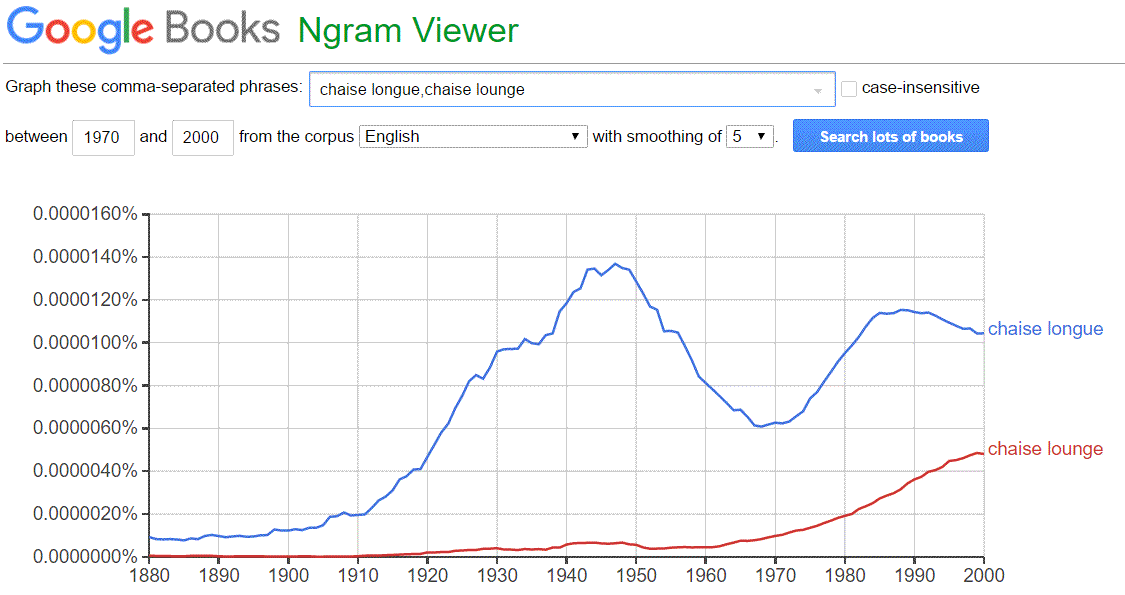
Read more about the meaning and origin of ‘Chaise longue’…
17. By in large
Correct version: “By and large”
‘By in large’ came about simply as a mishearing of ‘by and large’, which means ‘in general/near enough’. If you were a horny-handed sailor you would probably know that ‘by’ refers to the wind when it is coming from the direction the ship is sailing and ‘large’ when it is coming from behind (and apologies to any real sailors, I know that’s very much a shorthand version of the meanings). So, ‘by and large’ means ‘this way and that’ and this has mutated into our current understanding of the meaning.
If the above all sounds a bit vague then we can at least say for sure ‘by in large’ is wrong.
Read more about the meaning and origin of ‘by and large’…
18. Daring do
Correct version: “Derring-do”
This one is another of those totally understandable, but wrong, pronunciations – understandable because ‘derring’ is so antiquated a word it no longer exists without its friend ‘do’. In so far as it is still known it means little more than ‘daring’. The two words got muddled in a piece of Middle-Ages mistranslation.
It’s not exactly the most commonly used idiom any longer and, outside of reviews for old Errol Flynn films, you aren’t likely to see it. All the same, it’s best to have it right. ‘Daring do’ isn’t a phrase, but ‘derring-do’ is.
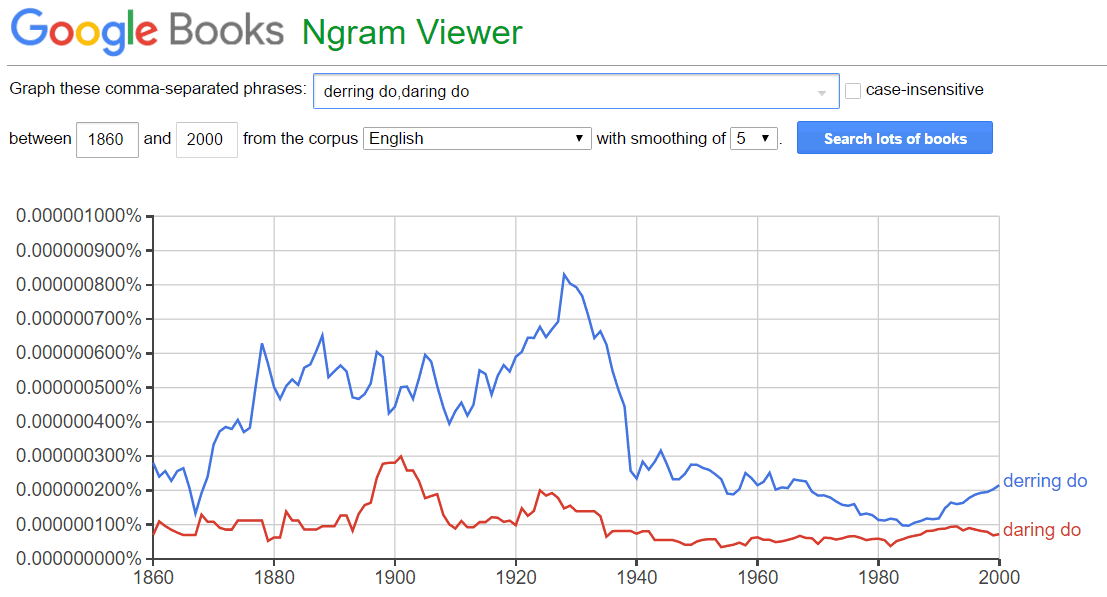
Read more about the meaning and origin of ‘Derring do’…
19. Do diligence
Correct version: “Due diligence”
If you do something diligently, you might be forgiven for thinking that you are showing ‘do diligence’. However, you aren’t, as ‘do diligence’ isn’t a thing.
‘Due diligence’ is a legal or business term referring to the proper care and attention given to a formal process. It just indicates that something important is given the diligence that it is due.
20. Damp Squid
Correct version: “Damp squib”
Squid are almost always damp, in fact I don’t think I’ve ever seen a dry one. That, and the obscurity of the word squib, is possibly what created this mistake.
Squibs are fireworks and damp ones are likely to lead to disappointment, hence the expression ‘damp squib’.
Read more about the meaning and origin of ‘Damp squib’…
21. Mute point
Correct version: “Moot point”
Once again an obscure word has been replaced by a more commonly used word. I’m not entirely sure what anyone might think ‘mute point’ might mean – perhaps a thing that isn’t talked about for some reason.
This expression also has legal origins and is nothing to do with ‘mute’. A moot is a legal discussion where hypothetical situations are debated for the sake of training or clarification. A ‘moot point’ is a point that is not finalised and open to such discussion.
Read more about the meaning and origin of ‘Moot point’…
22. Peaked my interest
Correct version: “Piqued my interest”
This is just a misspelling and, as such, there’s not much more to be said. What is interesting however is that the misheard ‘peaked my interest’ means pretty much the opposite of the correct ‘piqued my interest’.
If someone suggested that their interest had ‘peaked’ it would imply that their interest had already been taken to the highest peak, with nowhere to go but down. ‘Piqued’ means ‘stimulated’/’aroused’ and so if your interest is piqued you might expect it to be waxing and on the up slope.
Read more about the meaning and origin of ‘wax and wane’…
23. Nip in the butt
Correct version: “Nip in the bud”
‘Nip it in the bud’ means to put a stop to a problem while it is still small, the analogy being to removing the buds from plants before they begin to form shoots.
We don’t have butts here in England so what ‘nip in the butt’ means I’ll leave to the Americans.
Read more about the meaning and origin of ‘Nip in the bud’…
24. Piece of mind
Correct version: “Peace of mind”
This seems to have come about as a muddle between two real expressions ‘a piece of my mind’ and ‘peace of mind’ to form ‘piece of mind’.
‘Peace of mind’ means tranquility and is something to be welcomed. ‘Piece of mind’ sounds like a lump of someone’s brain – less welcome probably.
25. Old timer’s disease
Correct version: “Alzheimer’s Disease”
I don’t know if anyone ever made this mispronunciation in the real world or if it’s just a bit of comic wordplay. Just on the off chance that there is anyone who doesn’t know, there’s no disease called ‘Old timer’s Disease’.
26. Prostrate cancer
Correct version: “Prostate cancer”
‘Prostate cancer’, the cancer of the prostate gland, is a disease predominantly of older men and might have a better claim than Alzheimer’s to be called Old Timer’s Disease. Also, it is a genuine real-world mistake that is seen frequently, even used by people who should know better.
‘Prostrate cancer’ would be ‘cancer lying face down on the ground’ – as if cancer wasn’t bad enough already.
27. It’s a doggy-dog-world
Correct version: “It’s a dog-eat-dog world”
The expression ‘A dog-eat-dog world’ alludes to the kind of ruthless, red in tooth and claw world of wild animals. The implication of such a scenario is that either you destroy your competitors or they will destroy you. It’s quite a strange notion as dogs, although they sometimes fight to the death, don’t usually eat each other and there’s a long-standing English proverb to that effect – ‘Dog does not eat dog’.
Stranger still though is a ‘doggy-dog-world’. I’ve no idea what that might be.
28. Beg the question
This one is unusual because it isn’t a mispronunciation but a common misuse based on a basic misunderstanding of what the expression means. The incorrect meaning is so far out of the stable door that bolting it now seems rather futile. Nevertheless, for those who want to get it right, read on.
When most of us say that something ‘begs the question’ we mean that it suggests that a question should be asked. For example, “Jack’s unemployed and he’s bought a new Ferrari – it begs the question, where did he get the money?”.
However, the real meaning of ‘beg the question’ is almost the opposite. It really means ‘make the question unnecessary/there’s no need to ask’. For example, “Jack’s unemployed – it begs the question as to whether he will be paying higher rate income tax”.
The ‘begs’ in the expression really means ‘makes a beggar of’, that is, makes worthless – as in the phrase ‘beggar belief’. So, instead of ‘it begs for the question to be asked’ the phrase means ‘it makes asking the question pointless’. So now you know.
Read more about the meaning and origin of ‘Beg the question’…
29. Sneak peak
Correct version: “Sneak peek”
Just a spelling mistake, probably encouraged by the ‘eak’ ending of ‘sneak’.
‘Peak’ and ‘peek’ sound the same but a peak is the top of a mountain top, whilst a peek is a quick look. The correct expression is ‘sneak peek’, meaning a furtive or early look at something. ‘Sneak peak’ might be appropriate if you are trying to smuggle a mountain top past immigration guards, otherwise it’s ‘sneak peek’.
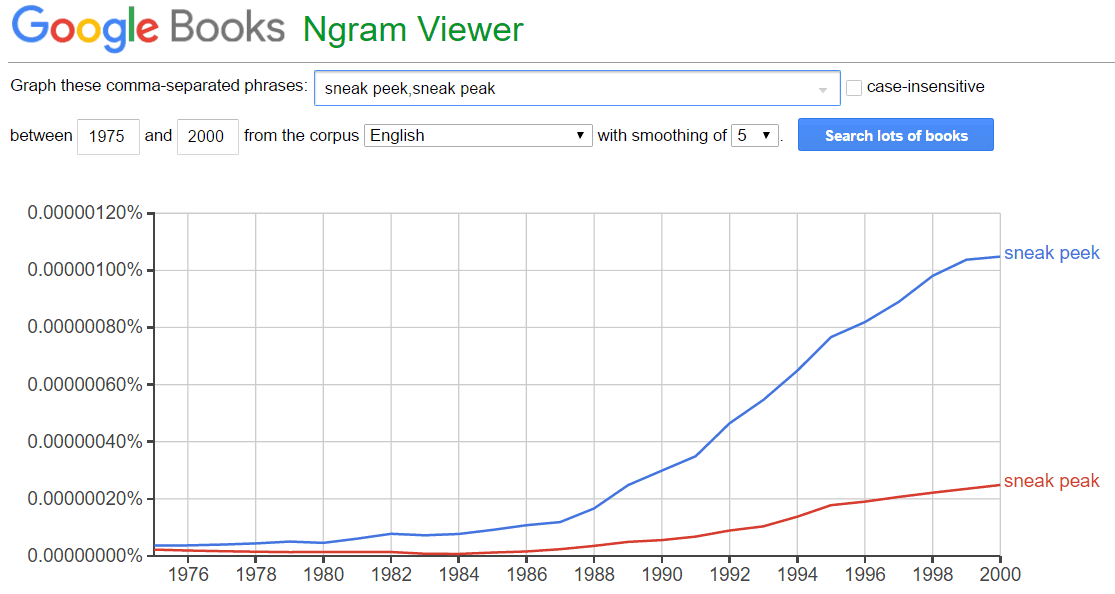
30. Deep-seeded
Correct version: “Deep-seated”
‘Deep-seated’ means firmly established – imagine sinking into a soggy armchair. ‘Deep-seeded’ isn’t really anything. If you were sowing bean seeds well underground so that squirrels couldn’t get at them, you might want to use it. Otherwise, it’s ‘deep-seated’.
31. Extract revenge
Correct version: “Exact revenge”
If someone does you harm and you want to get them back, ‘extracting revenge’ seems like what you might want to do, whereas ‘exacting revenge’ doesn’t appear to mean anything. However, ‘extract’ means to remove part of something and ‘exact’ (in this context) means ‘demand or enforce’. So, possibly contrary to our intuitions, ‘exact revenge’ makes sense and ‘extract revenge’ doesn’t. As well as ‘exacting revenge’ you can also ‘wreak revenge’ (see below).
32. Wreck havoc/wreak havoc
Correct version: “Wreak havoc”
Havoc is used to describe chaotic scenarios where damage is taking place, so ‘wreck’ seems like the kind of word that would go nicely with it. However, there’s no such expression as ‘wreck havoc’ and a little thought shows that it doesn’t really mean anything.
To ‘wreak’ is to inflict or cause harm or damage, so, when creating a major scene, ‘wreaking havoc’ is the phrase we want.
Read more about the meaning and origin of ‘Wreak havoc’…
33. Hunger pains/hunger pangs
Correct version: “Hunger pangs”
If you’re hungry you might feel some pain and so ‘hunger pains’ can be real and the expression is grammatically correct. It isn’t commonly used though – the expression ‘hunger pains’ is just a mishearing of ‘hunger pangs’.
Pangs are sharp spasms of pain and the feelings associated with hunger are called ‘hunger pangs’.
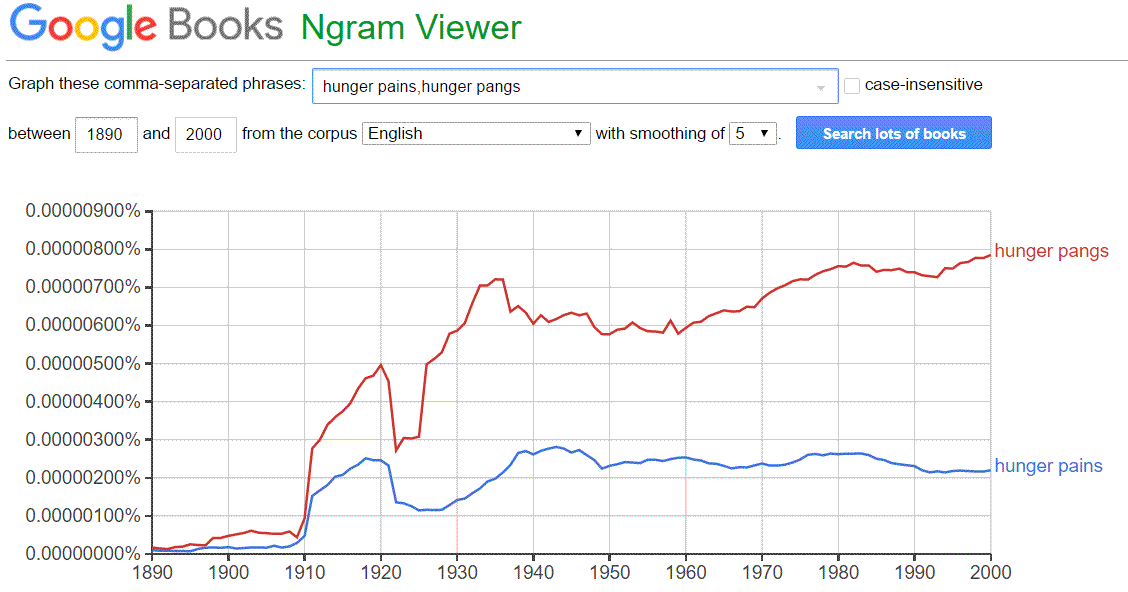
34. Fall by the waste side
Correct version: “Fall by the wayside”
This expression means ‘fail to stay the course’ and the ‘waste side’ is where we might expect to find ourselves if we did that. Like many of the correct words that have been substituted in the phrases above, ‘wayside’ is rather antiquated and not a word we now come across in everyday speech.
A wayside is just the side of a path or road. ‘Fall by the waste side’ might seem to make sense but it is the result of a mishearing of ‘fall by the wayside’.
This is an old English expression and its best known usage is in the biblical Parable of the Sower – “As he sowed, some fell by the way side”.
This page is about misuse of the meanings of phrases. If you like this sort of thing you might like to check out my list of common mistakes about the origins of phrases – The Nonsense Nine.
Also, mispronounced song lyrics are called Mondegreens. Here’s a select list of them.

